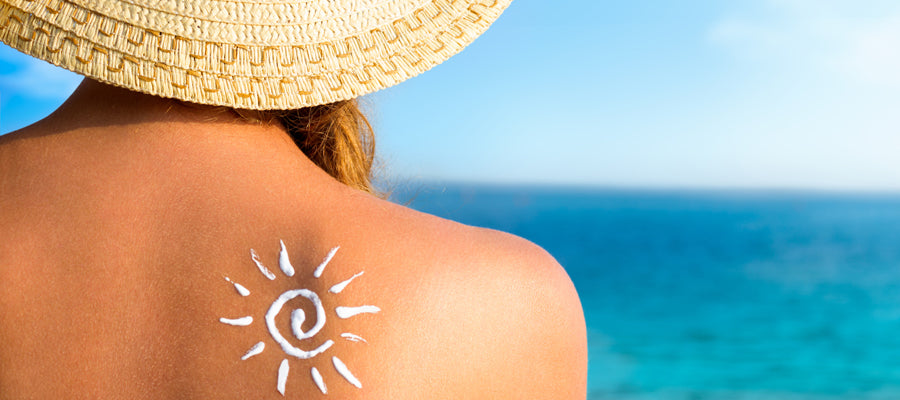
Protect your skin: Everything you need to know about the sun, sunscreens, and how to take care of yourself
Share
Do you know what's happening to your skin when you expose yourself to the sun?
The sun is an essential source of vitamin D and has multiple health benefits, but it's also one of the main risk factors for the skin. If we don't take the proper precautions, sun exposure can lead to unwanted consequences such as burns, dark spots, and premature aging. To help you protect your skin, in this blog, we explain everything you need to know about sunscreens and how they can protect your skin from the sun's harmful effects.
What key concepts should you know about sunscreens?
You may have heard terms like SPF , broad spectrum , or physical filters , but do you really know what they mean? In this article, we explain all these essential concepts to help you choose the right sunscreen for your skin type.
Also, let's talk about a phenomenon that's been causing a stir: "solar callus." This viral trend is related to how the skin responds to repeated sun exposure. Are you familiar with it? If not, keep reading, because we'll tell you everything you need to know.
Your sunscreen from last year? It's no good anymore!
Did you know that sunscreen expires? Yes, even if your sunscreen is left at the bottom of your bag or on the bathroom shelf, you can't continue using it indefinitely. After opening, its effectiveness decreases over time, and around the 6-month mark (PAO), it will no longer provide the expected protection, which could increase the risk of burns or irritation. It's time to renew your sunscreen for this summer.
What is SPF?
SPF (sun protection factor) is the number on sunscreen labels, such as 15, 30, 50, etc. This number tells you how much longer you can stay in the sun without burning compared to not wearing sunscreen. For example, if your skin starts to burn after 5 minutes in the sun without protection, a sunscreen with SPF 15 will allow you to stay in the sun for 75 minutes without damage (5 minutes x 15 = 75 minutes). The higher the SPF, the longer the protection, but always remember to reapply sunscreen every 2 hours, or more often if you get wet or sweaty.
Common myth: “With a low SPF I tan faster”
This is false. Although a low SPF will tan faster, it also exposes you to the risk of sunburn and cell damage. A higher SPF gives you more protection, meaning you don't need to reapply it as frequently, but it's still essential to reapply sunscreen after swimming or sweating.
The effects of the sun on the skin: Benefits and risks
Benefits of sunlight:
- Strong Bones : Sunshine is the main source of vitamin D, which is crucial for calcium absorption and bone health.
- Strengthens the immune system : Vitamin D also plays an important role in the function of the immune system.
- Improves mood : Sunlight increases serotonin levels, improving our emotional well-being.
- Regulates sleep : Exposure to the sun in the morning can help regulate the circadian rhythm and improve rest.
- Reduce stress : Being outdoors, in contact with nature, is an excellent remedy against stress.
Risks of sunlight:
- Burns and erythema : Prolonged exposure may cause immediate damage, such as sunburn.
- Premature photoaging : Accumulated sun damage accelerates the appearance of wrinkles and loss of skin elasticity.
- Sun spots : Uncontrolled exposure can alter melanin production, causing hyperpigmentation and spots.
- Cell and DNA damage : Over the long term, solar radiation can damage our cells and DNA, which can have more serious effects.
With that out of the way, let's move on to the next point: Have you heard of solar callus? Do you know what it is? We'll explain.
Solar Callus: What is it and why should we avoid it?
Sun callus has become a viral trend on social media. It's based on the misconception that sun exposure without sun protection is a way for the skin to "get used to it" and become more resistant, preventing sunburn. However, dermatologists and specialists warn that this practice significantly increases the risk of serious skin damage. Exposure without sun protection can alter cellular DNA, causing cumulative damage over time, which increases the likelihood of developing skin cancer, premature aging, and other complications.
Ultraviolet radiation indices: Know to protect
Ultraviolet (UV) radiation indices are a crucial measure for determining the intensity of solar radiation and how it can affect our skin. According to the WHO , this index allows us to understand radiation levels and act accordingly to protect our skin.
How can you check the UV index for your area? Nowadays, most mobile weather apps include UV radiation measurement, providing you with accurate, hourly data. Don't forget that if the index exceeds 3, it's crucial to take protective measures.
Remember: The higher the UV index, the greater the risk of skin and eye damage . It's essential to stay well-informed, especially during peak UV hours.
Alternative to Solar Callus: Sunbathing
Not all is lost; the sun also has many health benefits. Instead of exposing yourself to the sun without protection, we offer a safer alternative: sunbathing .
The key is to limit exposure time and choose the right times of day:
- Ideally, between 7:00 and 9:30-10:00 in the morning, or after 18:00 until 21:00 , when UV radiation is lowest.
- Limit exposure to 10 minutes .
- For the rest of the day, always protect your skin! Use sunscreen with SPF 50 and physical filters.
Also, during the hours with the highest UV index, remember to protect yourself with accessories like sunglasses , hats , or clothing with SPF protection . This way, you'll be sure to enjoy the sun safely.
Types of Solar Radiation: UVA, UVB and Blue Light
Solar radiation is not only visible as light, but is composed of different types of radiation that affect our skin in various ways. Although we can't see it, our skin feels it.
- UVB rays : These rays affect the skin's surface layer (epidermis). They are responsible for sunburn and redness.
- UVA rays : Penetrate deeper, reaching the dermis and even the hypodermis. These rays have a cumulative effect and can cause premature aging and dark spots .
- Blue Light (HEV) : Although blue light is a form of visible radiation, it has also been identified as harmful to the skin. It comes from the sun, but also from electronic devices such as phones, computers, and LED screens . Prolonged exposure can impair cell renewal and collagen synthesis , and increase oxidative stress , damaging the skin's barrier function.
Why should your sunscreen be broad spectrum?
When choosing a sunscreen, it's important that it be broad-spectrum . This means it offers protection against UVA, UVB, visible light (including blue light), and infrared (IR) . Broad-spectrum protection is essential for effective defense against all harmful solar radiation.
Titanium dioxide and zinc oxide are common physical filters that protect against UVA and UVB rays, but their ability to block blue light is limited. For this reason, the industry is developing new, targeted active ingredients to protect us from this type of radiation, which is increasingly present in our lives.
Sunscreens: What are they and what types are there?
Sunscreens are responsible for blocking or deflecting the sun's ultraviolet rays. They are divided into two main groups:
-
Chemical (organic) filters : These absorb UV energy and convert it into heat. Although effective, some of these filters can cause allergic reactions or irritation in sensitive skin. The most common are oxybenzone , avobenzone , and octinoxate .
-
Physical (inorganic) filters : These form a barrier on the skin that reflects or scatters UV rays. They are best recommended for sensitive skin, as they have minimal penetration and are less likely to cause irritation. The best-known are zinc oxide and titanium dioxide , which also provide broader protection.
Physical filters are the safest for sensitive and atopic-prone skin, and are the most recommended if you're looking for effective and environmentally friendly sun protection.
The sun can be beneficial for our health, but only if we take the proper precautions. Avoiding practices like "sun callus" and opting for controlled exposure with the right sun protection is key to keeping our skin healthy. Don't forget to choose a broad-spectrum sunscreen with physical filters and apply the right amount to ensure effective protection.
This summer, enjoy the sun safely and responsibly!
